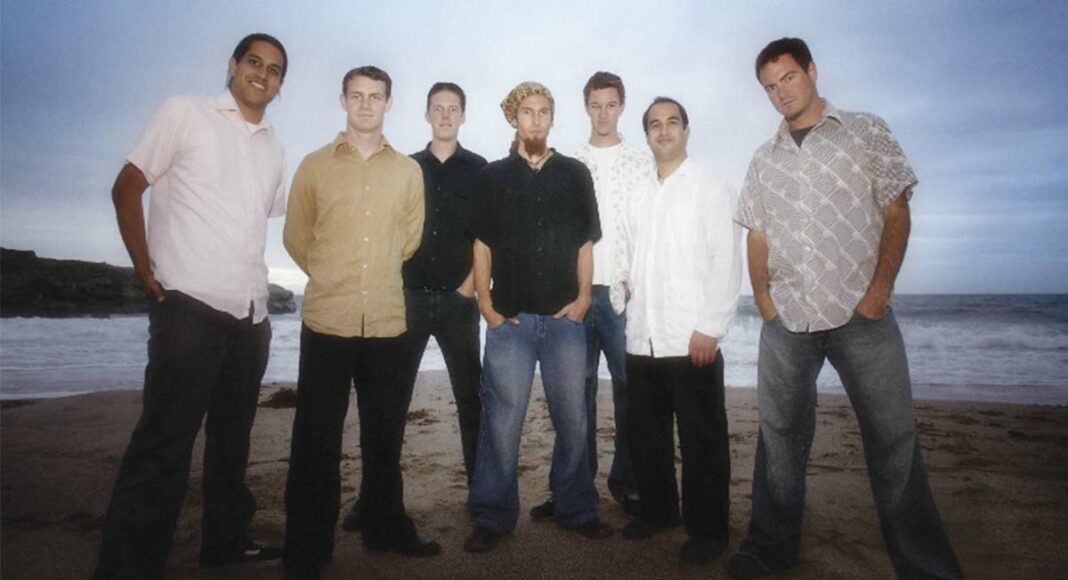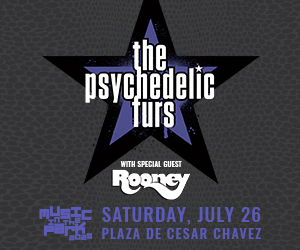In the mid-2000s, world-beat ensemble Universal Language ruled the local scene. In 2005, they were headlining major local venues, released their sole album, Revolución, and had a feature headlining spot on Reggae On The River. They were spontaneously joined on stage at that festival by rapper/reggae artist Michael Franti, who freestyled with them for ten minutes.
“I didn’t see him on the side or anything. He was just there. I had never met him in person till I was on stage with him. That was awesome,” recalls singer Moshe Vilozny.
But not long after this incredible moment, Universal Language splintered, with some members moving out of town, and others moving on to other projects. The band never broke up, but they stopped playing.
This Friday, the original seven-piece takes the stage for one show at Moe’s. It’ll be the first show Universal Language has played in eight years, and the first time the original seven have shared the stage in ten.
“It’s special and it’s a big deal, and we’re only doing it for one show. That’s the only event to catch us at,” Vilozny says.
Excitement among the members is high—Universal Language was a fun band for not just the audience, but also for the band members themselves. The group fused many elements together into one big dance explosion: Latin, reggae, funk, rap and Afro-cuban. They were all over the map, and even sang in three languages: English, Spanish, and Hebrew. There wasn’t anything like it in Santa Cruz’s thriving live scene at the time.
“It’s a fun band to play in because we’re not pigeonholed into a certain category where people expect just one thing. We can do whatever we want, have fun and nobody’s bored or feels like they have to do just this one thing,” Vilozny says.
In addition to the strong Latin rhythms, and a fun party vibe, Universal Language sang songs with strong political messages. Some, like “Baila,” were lighthearted dance tunes, but others addressed serious political issues. What made them truly unique is that they address very specific global political issues. “It was world music for world peace,” Vilozny says.
Since everyone brought their own background into the band, there was a lot of ground to cover. For instance, David “El Pacha” Alvarez, who was from San Cristobal, Mexico, discussed the Zapatista movement on “Revolución,” which he co-wrote with Vilozny. “Colorblind,” which was written by Vilozny, discusses the tension between Israelis and Palestinians—an important issue for him, as his family is Israeli.
The group formed in 2003, originally just Vilozny and Alvarez. The two met in Santa Cruz, shortly after Alvarez moved up from Mexico. Soon Vilozny invited longtime friend Ethan Sanchez to join on the upright bass. The first gigs were acoustic and intimate. The rest of the band built up over the course of about six months. By the end of 2003, they were a full world-beat explosion of a live band, and drawing well in town.
“Even when it was a small band, people were dancing. It was on the same train. It just kind of got thicker and thicker over the years,” Vilozny says.
By the time the group stopped playing, they were still top draws in the area. Vilozny has been clear the past decade that Universal Language didn’t break up, but were on the back burner. “We did a lot of good stuff. It got to a certain point, I felt satisfied. I felt like this is what this experience is. I could get my music out to people and have it appreciated. I felt satisfied, and ready to focus on my family,” Vilozny says.
These days, folks can see little pieces of Universal Language all over Santa Cruz’s music scene. Vilozny has a solo act. Pianist Gianni Staiano plays in 7 Come 11. Guitarist Renzo Staiano is in LeVice. Trumpet player Jon Cavanaugh plays in Flor De Caña. The show this Friday is a rare step back into their glory days of the mid-2000s, but hopefully it won’t be the last time they get together.
INFO: 9 p.m., Aug. 26, Moe’s Alley, 1535 Commercial Way, Santa Cruz. $9/adv, $12/door. 479-1854.












